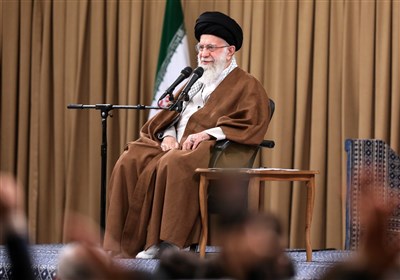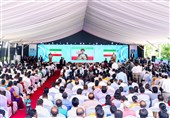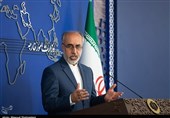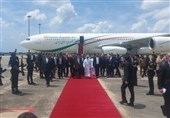Bahraini Regime Trying Sheikh Qassim on ‘Imaginary Crimes’: Ex-US Diplomat
TEHRAN (Tasnim) – An American author and former diplomat deplored the Manama regime’s crackdown on dissent and said trying Sheikh Isa Qassim, the spiritual leader of Bahrain’s Shiite majority, on “imaginary crimes” proves how illegitimate the ruling regime is.
“Stripping him (Sheikh Qassim) of his citizenship and seeking to try him on the basis of bizarre and imaginary crimes, such as money laundering, shows how incompetent and illegitimate the Al Khalifa government really is,” Michael Springmann, the former head of the American visa bureau in Saudi Arabia, said in an interview with the Tasnim News Agency.
“The (Bahraini) king likely knows his days are numbered, reinforcing his desire to hang on to his increasing shaky throne,” he said.
J. Michael Springmann served in the US government as a diplomat with the State Department's Foreign Service, with postings in Germany, India, and Saudi Arabia. He left federal service and currently practices law in the Washington, DC, area. Springmann’s works and interviews have been published in numerous foreign policy publications, including Covert Action Quarterly, Unclassified, Global Outlook, the Public Record, OpEdNews, Global Research and Foreign Policy Journal.
The following is the full text of the interview:
Tasnim: In a recent report, the Bahrain Center for Human Rights announced that during the days between April 10 and April 16, the Manama regime handed down prison terms, including three life sentences, to 52 citizens on political grounds. The Al Khalifa regime sentenced the 52 to jail terms amounting to 313 years in total. The security forces of the regime have also arrested 10 other citizens, including a child, in the mentioned period. Manama also plans to hold a trial session of Sheikh Isa Qassim, the spiritual leader of the Shiite majority in the kingdom, on May 7 on trumped-up charges. Sheikh Qassim’s previous trials were adjourned several times after the top cleric did not appear in court. In the meantime, a sit-in that supporters of Sheikh Qassim have staged in front of his house in Diraz to protect him against the regime forces has remained in place for months. It seems that the Al Khalifa regime is not going to modify its approach to the opposition. What is your assessment of the developments?
Springmann: My assessment of the Al Khalifa regime is that it is a repressive one. I also believe that it is a desperate one, fearing that its grip on power is weakening. The repeated arrests, with lengthy prison terms, demonstrate that Bahrain's "government" is so close to the United States and so far from democracy. Only solid relations with America (and Great Britain) keep the king in control. US and UK weapons sales help ensure that the king has more firepower than the dissidents. The Bahraini people, of whatever religion, are adamantly opposed to the government's repression. Since 2011, they have been demonstrating for democracy, a constitution, and limits on al-Khalifa power. While the king had promised all of the foregoing upon his accession to the throne, he has reneged on his promises, sparking continued opposition to his policies. In addition, with each manifestation of dissent, the king has jailed more demonstrators and intensified the crackdown on opponents and religious leaders such as Sheikh Isa Qassim, who have done nothing more than being a vocal critic of the corrupt government and being a leader of his people. When the Sheikh spoke out against the Saudi invasion to prop up the king in 2011, he did nothing more than what any patriotic Bahraini would do. Stripping him of his citizenship and seeking to try him on the basis of bizarre and imaginary crimes, such as money laundering, shows how incompetent and illegitimate the Al Khalifa government really is.
The king likely knows his days are numbered, reinforcing his desire to hang on to his increasing shaky throne. He can see that more and more of "his" people oppose his dictatorial government, and so, puts Sheikh Qassim under house arrest, jails as many citizens as he can, and imports Sunni Arabs from all over to balance the Shiite majority. His situation is much like the King Louis XVI of France in the 18th Century--out of touch with reality, obsessed with power and privilege, and unconcerned with the well-being of his countrymen. And, he will likely end up like Louis.
Tasnim: The Bahraini regime has recently decided to change the constitution to allow civilians to be tried in military courts. The decision by the 40-seat Council of Representatives, the elected lower house of the country's National Assembly, comes after a royal decree a month earlier restored the power of its domestic spy service to make some arrests. What’s your take on that?
Springmann: This is another example of the king's desperation. He is using a tame Council of Representatives to rubber-stamp his decision to increase his repression of Bahrain. Al-Khalifa evidently fears that civil courts might not always issue guilty verdicts against the people the spy services arrest. And using the spy services, with their skills, contacts, and paid informants, to ferret out members of the democratic opposition shows that his government knows the resistance runs wide and deep.
Tasnim: How do you see the human rights situation in Bahrain and the future of the February 14 revolution in the Persian Gulf country?
Springmann: Eventually, the clock will run out on al-Khalifa. Only the US 5th Fleet, headquartered in Manama, keeps the country going. With Bahrain's failing economy, the 20,000 US sailors, civilians, and dependents pour vast sums of money into the country, both for personal items and for ship's supplies. Regrettably, few in America seem to be paying attention to this--and what a waste of resources this is. I saw one report that suggested you could supply electricity to the entire US for a year's cost to run the 5th Fleet. Perhaps President Trump, with his emphasis on making "allies" pay for American armed protection, might change things. More and more people in Britain are questioning the UK's arms sales to a despotic government.
If support is withdrawn or reduced, the king will have more problems than before. Therefore, the human rights situation in the country will continue to worsen, as al-Khalifa seeks to retain his failing grip on power. As repression increases, opposition to it will rise, until the situation becomes intolerable, even for the US and UK. And the US doesn't always stand by its tame dictators, as its withdrawal of support for Hosni Mubarak showed. When buying up an openly-undemocratic leader becomes an embarrassment for the US, America often drops him.
Tasnim: It has been six years since troops from Saudi Arabia were deployed to Bahrain to assist in the Manama regime’s crackdown on peaceful protesters. In your opinion, what is the reason behind the deployment of the Saudi forces? What geopolitical goals is Riyadh pursuing by the military intervention in the island country?
Springmann: First, the Saudi forces stepped in to prop up a failing, repressive monarch. Saudi Arabia, another highly-undemocratic entity, also feared the "taint" of freedom if the Bahraini revolt succeeded. There are plenty of restive Saudis, particularly those in the Eastern Province, nearest Bahrain. Additionally, there are many Saudis who have studied and worked abroad, seeing how other countries permit freedom of expression and yet remain stable.
Second, the Saudis have an irrational fear of Shiite Iran and see "a foreign hand" behind every bush or palm tree in the region. In their warped vision, they likely figured Iran was involved in or would benefit from a successful regime change by the majority Shiite in Bahrain. This is the rationale that the Saudis use to explain their destruction of Yemen--"Iran is seeking control there."
Third, the Saudis seem to be moving from a position that used other countries to implement their own goals. Now, it appears that the Kingdom is looking to exert power and control in the region more directly. It began with supplying arms, ammunition, and funds to terrorists in the Middle East. Now, beginning with the invasion of Bahrain and the attacks on Yemen, Saudi Arabia looks towards becoming the dominant state there.





